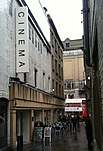Tyneside Cinema
The Tyneside Cinema is an independent cinema in Newcastle upon Tyne. It is the city's only full-time independent cultural cinema, specialising in the screening of independent and world cinema from across the globe. The last remaining Newsreel theatre to be in full-time operation in the UK, it is a Grade II-listed building.[1] The Tyneside's patrons are filmmakers Mike Figgis and Mike Hodges, and musicians Neil Tennant of the Pet Shop Boys and Paul Smith of Maxïmo Park. Its cultural remit is set by the trustees and is a requisite for continued funding from sponsors such as the BFI and the Arts Council.
 The entrance of the Tyneside Cinema, looking towards Pilgrim Street. (2010) | |

| |
| Former names | News Theatre; Tyneside Film Theatre |
|---|---|
| Address | Pilgrim Street, Newcastle upon Tyne United Kingdom |
| Type | Cinema |
| Construction | |
| Opened | 1 February 1937 |
| Renovated | May 2008 |
| Website | |
| Official website | |
Alongside its core programme of cultural cinema, the newly refurbished Tyneside Cinema holds daily free screenings of archive newsreel footage[2] and guided tours. The cinema also allows budding producers and digital artists to network and present their work.[2] A £7m restoration and renovation project occurred between 2006 and 2008,[3] and the venue now boasts digital projection and 3D facilities alongside traditional film projection.
History
The Tyneside building was conceived, designed and built by Dixon Scott, a local entrepreneur and the Great Uncle of film directors Sir Ridley and Tony Scott.[4] Scott had travelled in the Middle and Far East, and his experiences influenced the décor of the first floor landing and foyer of the Tyneside building.[5] Scott decorated the building with his own take on Art Deco, as influenced by his Eastern travels.[6]
The Tyneside Cinema was opened as a news cinema, the Bijou News-Reel Cinema on 1 February 1937, and was commonly known as the News Theatre.[7] Screenings would include a mixture of travel, sport, and news films, as well as cartoons.[8]
In 1937, the cinema became the home of the Tyneside Film Society, the origin of the Tyneside Cinema itself which, by the late 1950s, had grown into the largest film society in the UK outside London.[9] The popularity of television led to a decline in audiences and consequently the cinema was closed in 1968. After a brief period it was reopened as a film theatre by the BFI.[10] The cinema closed again in 1975. A case for re-opening the cinema, then known as the Tyneside Film Theatre, was put together by the Tyneside Filmgoers Group and it was re‐opened in 1976.[11]
Restoration and reopening
The cinema had occupied its Pilgrim Street site since 1937, and had by 1999 declined to a critical state, with many believing it would eventually be forced to close.[2] The cinema required a number of improvements, and despite its history and prime location, the cinema had a serious financial deficit. A significant investment in the structure was required, and following a survey of the building, the cinema's board of trustees realised that a capital investment of about £7m would be necessary.[2] The project secured the support of organisations including One North East and the Northern Rock Foundation[2] Seats removed from the Classic screen were sold in 2006, raising more than £5000 for the restoration project.[12] The stated aim of the project was to celebrate the cinema's heritage as a newsreel theatre and also look to its future in the digital age.[13]
The £7m restoration and renovation project was undertaken between November 2006 and May 2008. Original features inside the building had to be protected during the project, and the work uncovered a pair of original stained glass windows and mosaic floor tiling which had been hidden for years.[14][15] Expanding the cinema in its town centre location was difficult due to the limited space available. Building works proceeded upwards, and the area between the cinema and its neighbouring building was also used.[16]
The cinema obtained a temporary lease at Gateshead's Old Town Hall, which allowed the cinema to screen films in a single theatre under the Tyneside Cinema brand.[2] Themed screenings were held across Newcastle to allow the public access to the Tyneside Cinema experience as work on the restoration project continued. These included a screening of It’s a Wonderful Life at the Discovery Museum with mulled wine and mince pies for attendees, and a screening of Monty Python's Life of Brian at St. Mary’s Church.[2]
The Tyneside reopened in May 2008, following the major restoration of its original auditorium, alongside a modern extension and redevelopment of the upper floors designed by Fletcher Priest Architects and consulting engineers Cundall. The work added a new level to the building with two new screens, the Roxy and the Electra, housed on top of each other. A single projection block behind serves all of the cinema's screens.[17][18] The increase in screens enabled more flexibility to respond to demand and created space to move films around.[19] A new bar, and a film learning centre called the Tyneside Studio, partly designed by filmmaker Mike Figgis, were also installed.
Following the redevelopment, the site's Venue Manager was Leigh Venus, who went on to re-open the former Bede's World heritage site as Jarrow Hall in 2016.[20][21] In 2014 the cinema was further expanded by the addition of the Tyneside Bar Café in an adjoining premises which had previously been occupied by a bank.[22]. The site also included a new purpose built dual space ('The Gallery'), functioning as a Gallery for artists' moving image during the day and as a Cinema in the evening[23]. The Gallery, curated by Elisabetta Fabrizi and funded by ACE, commissioned and showcased projects by both established and emerging artists including John Akomfrah, Aura Satz, Phil Collins, Rachel Reupke, Ursula Mayer, John Smith and Oreet Ashery.[24]
In 2020, the cinema was forced to close its doors temporarily due to the COVID-19 pandemic. The cinema started a donation campaign to offset their financial losses, but the CEO said it was at risk of permanent closure.[25]
Controversy
In the summer of 2020, allegations of sexual assault, bullying and harassment emerged on social media. In response, CEO Holli Keeble and chair of the board Lucy Armstrong issued a statement saying that they took "the safety and well-being of our team at Tyneside Cinema very seriously, and strive to cultivate a culture of equality and inclusivity in the workplace".[26] Following this, over 200 current and former employees issued a counter-statement condemning the official response, stating: "We feel strongly that existing training policies, grievance procedures and mechanisms for whistle-blowing are not fit for purpose. We take this view based on substantial anecdotal evidence from colleagues and former colleagues. We do not feel that Tyneside Cinema is a safe workplace for everyone."[27] Following this, the board of trustees announced that a review by a "high-level independent consultant" would take place.[27]
This came less that a year after, in November 2019, it was ruled by Newcastle Employment Tribunals that Tyneside Cinema committed an act of disability discrimination and failure to make reasonable adjustments against an ex employee in accordance with The Equality Act 2010. Compensation was awarded to the ex employee following a remedy hearing in January 2020.
Awards
The Tyneside Cinema won the Building Conservation and Tourism and Leisure categories as well as the overall accolade Project of the Year at the 2009 Royal Institution of Chartered Surveyors North East Renaissance Awards at Newcastle Civic Centre on 25 April 2009. Judges described the Tyneside Cinema restoration as “an excellent example of a building conservation project”, calling the cinema “a successful commercial venture that has employed creative and innovative design to breathe new life into a leisure facility that is rare and in many ways unique, a project that is playing a regenerative role in the widest sense of the word”.[28]
References
- Tyneside Cinema (2017-01-01). "Tyneside Cinema - Cinema in Newcastle upon Tyne, Newcastle upon Tyne". NewcastleGateshead. Retrieved 2017-07-08.
- "It's a wonderful life for revived cinema with rare history". nebusiness.co.uk. 2009-03-30. Archived from the original on 2011-08-07. Retrieved 2009-10-12.
- Tyneside Cinema reopens (2008-05-22). "Tyneside Cinema reopens". BBC. Archived from the original on 2011-01-10. Retrieved 2009-10-12.
- Tyneside Cinema heritage. "Tyneside Cinema heritage". BBC. Archived from the original on 2012-07-29. Retrieved 2009-10-12.
- Tyneside Cinema heritage (27 November 2014). "Tyneside Cinema heritage". BBC. Retrieved 2009-10-12.
- Tyneside Cinema heritage. "Tyneside Cinema heritage". BBC. Retrieved 2009-10-12.
- Tyneside Cinema heritage (1937-02-01). "Tyneside Cinema heritage". BBC. Retrieved 2009-10-12.
- Tyneside Cinema heritage. "Tyneside Cinema heritage". BBC. Retrieved 2009-10-12.
- http://www.n-e-life.com/foryou/article2.php?id=78516
- Adam Williams. "Cine-files: Tyneside Cinema, Newcastle | Film". The Guardian. Retrieved 2017-07-08.
- Tyneside Cinema heritage. "Tyneside Cinema heritage". BBC. Archived from the original on 2012-07-22. Retrieved 8 April 2020.
- Tyneside Cinema redevelopment. "Tyneside Cinema redevelopment". BBC. Retrieved 2009-10-12.
- Tyneside Cinema reopens (1937-02-01). "Tyneside Cinema reopens". BBC. Retrieved 2009-10-12.
- Tyneside Cinema heritage. "Tyneside Cinema heritage". BBC. Retrieved 2009-10-12.
- Tyneside Cinema redevelopment. "Tyneside Cinema redevelopment". BBC. Retrieved 2009-10-12.
- Tyneside Cinema redevelopment. "Tyneside Cinema redevelopment". BBC. Archived from the original on 2012-07-18. Retrieved 2009-10-12.
- Tyneside Cinema redevelopment. "Tyneside Cinema redevelopment". BBC. Retrieved 2009-10-12.
- Tyneside Cinema heritage. "Tyneside Cinema heritage". BBC. Archived from the original on 2012-07-29. Retrieved 2009-10-12.
- Tyneside Cinema redevelopment. "Tyneside Cinema redevelopment". BBC. Retrieved 2009-10-12.
- Morton, David (7 April 2017). "Jarrow Hall - formerly Bede's World - opens". Chronicle Live. Newcastle upon Tyne. Retrieved 31 October 2017.
- Rahbarkouhi, Aranda (27 Sep 2013). "Newcastle city cinema looks to a greener big picture". The Journal. Retrieved 31 October 2017.
- Ford, Coreena (2014-08-07). "A first look: curtain up time at the Tyneside Cinema Bar Cafe". The Journal. Retrieved 2017-07-08.
- Gibson, Robert, '£1.3 million Tyneside Cinema redevelopment', in The Chronicle, 21 Feb. 2014, http://www.thejournal.co.uk/business/business-news/newcastle-architects-lead-13m-tyneside-6729726
- Fabrizi, Elisabetta, 'Is This Cinema?', in Balsom, E., Perks, S., Reynolds, L., 'Artists' Moving Image in Britain since 1989', Paul Mellon Foundation/Yale University Press, 2018.
- "Tyneside Cinema 'could close permanently' after coronavirus crisis". Evening Chronicle. 26 March 2020.
- "Cinema faces abuse and harassment claims". BBC News. 2020-06-30. Retrieved 2020-07-03.
- "Abuse and harassment claims cinema launches review". BBC News. 2020-07-01. Retrieved 2020-07-03.
- "North East Cinema Scoops 3 Top Awards | Northern Film & Media | investing in people and ideas". Northernmedia.org. 2009-04-26. Retrieved 2009-10-12.
Further reading
- Chaplin, Michael (2011). Come and See: The Beguiling Story of the Tyneside Cinema. New Writing North. ISBN 0956655114.